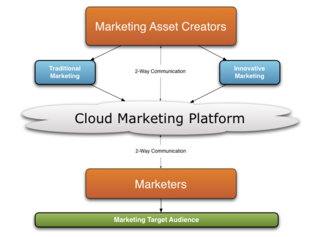Marketing is the study and management of exchange relationships. It is the business process of creating relationships with and satisfying customers. Because marketing is used to attract customers, it is one of the primary components of business management and commerce. Marketers can direct product to other businesses or directly to consumers.

Distribution is one of the four elements of the marketing mix. Distribution is the process of making a product or service available for the consumer or business user who needs it. This can be done directly by the producer or service provider, or using indirect channels with distributors or intermediaries. The other three elements of the marketing mix are product, pricing, and promotion.
Competitor analysis in marketing and strategic management is an assessment of the strengths and weaknesses of current and potential competitors. This analysis provides both an offensive and defensive strategic context to identify opportunities and threats. Profiling combines all of the relevant sources of competitor analysis into one framework in the support of efficient and effective strategy formulation, implementation, monitoring and adjustment.
Mass marketing is a market strategy in which a firm decides to ignore market segment differences and appeal the whole market with one offer or one strategy, which supports the idea of broadcasting a message that will reach the largest number of people possible. Traditionally mass marketing has focused on radio, television and newspapers as the media used to reach this broad audience. By reaching the largest audience possible, exposure to the product is maximized, and in theory this would directly correlate with a larger number of sales or buys into the product.

Direct marketing is a form of communicating an offer, where organizations communicate directly to a pre-selected customer and supply a method for a direct response. Among practitioners, it is also known as direct response marketing. By contrast, advertising is of a mass-message nature.
A chief marketing officer (CMO), also called a global marketing officer or marketing director, is a corporate executive responsible for marketing activities in an organization. Whilst historically these titles may have signified a legal responsibility, for example at Companies House in the UK, the titles are less strict/formal in the 21st Century and allow companies to acknowledge the evolving and increasingly significant role that marketers can play in an organisation, not least because of the inherent character of successful marketers. The CMO leads brand management, marketing communications, market research, product marketing, distribution channel management, pricing, and customer service.
Email marketing is the act of sending a commercial message, typically to a group of people, using email. In its broadest sense, every email sent to a potential or current customer could be considered email marketing. It involves using email to send advertisements, request business, or solicit sales or donations. Email marketing strategies commonly seek to achieve one or more of three primary objectives, to build loyalty, trust, or brand awareness. The term usually refers to sending email messages with the purpose of enhancing a merchant's relationship with current or previous customers, encouraging customer loyalty and repeat business, acquiring new customers or convincing current customers to purchase something immediately, and sharing third-party ads.

Advertising management is a planned managerial process designed to oversee and control the various advertising activities involved in a program to communicate with a firm's target market and which is ultimately designed to influence the consumer's purchase decisions. Advertising is just one element in a company's promotional mix and as such, must be integrated with the overall marketing communications program. Advertising is, however, the most expensive of all the promotional elements and therefore must be managed with care and accountability.
In marketing, promotion refers to any type of marketing communication used to inform or persuade target audiences of the relative merits of a product, service, brand or issue. The aim of promotion is to increase awareness, create interest, generate sales or create brand loyalty. It is one of the basic elements of the market mix, which includes the four Ps, i.e., product, price, place, and promotion.

An advertising campaign is a series of advertisement messages that share a single idea and theme which make up an integrated marketing communication (IMC). An IMC is a platform in which a group of people can group their ideas, beliefs, and concepts into one large media base. Advertising campaigns utilize diverse media channels over a particular time frame and target identified audiences.
Business marketing is a marketing practice of individuals or organizations. It allows them to sell products or services to other companies or organizations that resell them, use them in their products or services or use them to support their works. It is a way to promote business and improve profit too.
A target audience is the intended audience or readership of a publication, advertisement, or other message. In marketing and advertising, it is a particular group of consumers within the predetermined target market, identified as the targets or recipients for a particular advertisement or message. Businesses that have a wide target market will focus on a specific target audience for certain messages to send, such as The Body Shops Mother's Day advertisements, which were aimed at the children and spouses of women, rather than the whole market which would have included the women themselves.
Marketing ethics is an area of applied ethics which deals with the moral principles behind the operation and regulation of marketing. Some areas of marketing ethics overlap with media ethics.

Food marketing brings together the food producer and the consumer through a chain of marketing activities.
The following outline is provided as an overview of and topical guide to marketing:
Digital marketing is the marketing of products or services using digital technologies on the Internet, through mobile phone Apps, display advertising, and any other digital mediums. Digital marketing channels are systems based on the Internet that can create, accelerate, and transmit product value from producer to a consumer terminal, through digital networks.
A target market is a group of customers within a business's serviceable available market at which a business aims its marketing efforts and resources. A target market is a subset of the total market for a product or service.
Sports marketing is a subdivision of marketing which focuses both on the promotion of sports events and teams as well as the promotion of other products and services through sporting events and sports teams. It is a service in which the element promoted can be a physical product or a brand name. The goal is to provide the client with strategies to promote sports or to promote some other product, service, business or cause through sports. Sports marketing is also designed to meet the needs and wants of the consumers through exchange processes. These strategies follow the traditional four "P"'s of general marketing: Product, Price, Promotion and Place. Another four "P"’s are added to sports marketing, relating to the fact sports are considered to be a service. The additional 4 P’s are: Planning, Packaging, Positioning and Perception. The addition of the four extra elements is called the "sports marketing mix."
Word-of-mouth marketing differs from naturally occurring word of mouth, in that it is actively influenced or encouraged by organizations. While it is difficult to truly control WOM, research has shown that there are three generic avenues to 'manage' WOM for the purpose of WOMM: 1.) Build a strong WOM foundation, 2.) Indirect WOMM management which implies that managers only have a moderate amount of control, 3.) Direct WOMM management, which has higher levels of control. Proconsumer WOM has been suggested as a counterweight to commercially motivated word of mouth.

Cloud marketing is the process of an organisations efforts to market their goods and services online through integrated digital experiences, by which they are specialised for every single end user. The aim is to use advertising methods to target customers via online applications through social media websites such as Facebook, Twitter and various online portals to target consumers. Cloud marketing platforms are supported with third parties which maintain the platform. Cloud Marketing was established by a company in Raleigh, North Carolina calling it SharedVue Marketing Technologies. The marketers targeting clients need to ensure their material is compatible with all electronic media devices. Cloud marketing requires efforts in data privacy and data protection especially for EU markets where GDPR general data protection regulation defines new rules.





